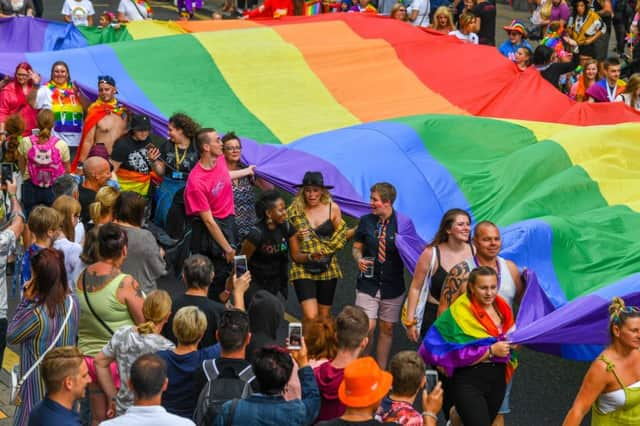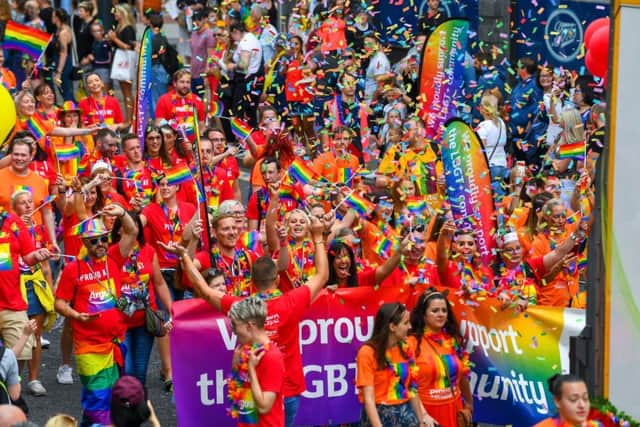Greg Wright: Big corporates can show their support for LGBT+ people by forcing Governments to get tough with online bigots


Five business stories to start your dayYorkshire firms summer blues persistEvents like Leeds Pride - which is Yorkshire’s biggest celebration of lesbian, gay, bisexual and trans life - are attracting a growing army of corporate sponsors as more employers become aware of the need to create workplaces where everyone can be true to themselves.
The giant strides towards equality were acknowledged at a major business event, the Pride of Place panel event, which I chaired at Sky Betting & Gaming’s office in Wellington Place. It was the second year the event had been staged and it acts as a sounding board for all those who are engaged in promoting respect and tolerance.
Advertisement
Hide AdAdvertisement
Hide AdEvery panellist endorsed the sentiments expressed by Rachael Culpan, the HR director at Equifax, who said: “We are going to be in a place eventually where ‘coming out’ won’t be a thing. Everyone will be free to be themselves.”


The growing list of corporate names supporting Pride shows that the battle for hearts and minds in the corporate world is being won.
However, the need for tolerance must be preached all the year round.
The wider world is not always such a welcoming place. People who are lesbian, gay, bisexual and transgender can face violence and abuse whenever they leave their front door. The levels of online abuse they face are truly chilling.
Advertisement
Hide AdAdvertisement
Hide AdIn a recent Parliamentary debate, Daniel Zeichner MP raised concerns about the terrible increase in online anti-LGBT+ hate crime.
He added: “Stonewall statistics tell us that the number of lesbian, gay and bisexual people who have experienced a hate crime or incident in the past year because of their sexual orientation has risen by 78 per cent, from 9 per cent in 2013 to 16 per cent in 2017. One in 10 LGBT people have experienced homophobic, biphobic or transphobic abuse online directed towards them personally in the last month.”
Mr Zeichner quoted Galop, the LGBT+ anti-violence charity, which said: “Online life is so enmeshed in our day-to-day lives that increasingly the online and offline world are not separate. Sometimes online hate speech is a part of wider pattern of harassment and abuse that is happening in other areas of our life, for example a neighbour that is targeting you in your home and online.”
The perpetrators know it is unlikely they will be caught. As Angela Eagle MP observed during the same debate, only 3 per cent of malicious communication offences are ever prosecuted. So the online bullies know that they will probably get away with it. The cycle of abuse continues.
Advertisement
Hide AdAdvertisement
Hide AdStonewall believes online platforms should communicate clearly to all online users that anti-LGBT abuse is unacceptable and advertise clear privacy, safety and reporting mechanisms.
The platforms must provide evidence that they are taking abuse seriously by liaising closely with the police and other relevant authorities. They must also take steps to keep the victims informed about the outcome of their complaint. There is a broader dimension to these concerns.
To quote Mr Zeichner: “Online abuse exists within a system that is run by capital-building algorithms, which push controversial or divisive content for increased clicks, and has a business model based on personal advertising but also maximum engagement regardless of content. That means that, too often, commercial online platforms are content to allow toxic environments, as the content that is pushed hardest is that which is divisive because it provokes extremely strong reactions.”
Online platforms thrive on spicy debate and controversy. But without effective policing of damaging content, how can anyone feel safe?
Advertisement
Hide AdAdvertisement
Hide AdThis is where the corporate world can flex its muscles by lobbying policymakers. They can persuade them to get a grip and enforce tougher sanctions against online bullies. Government likes to portray itself as the friend of business. The business community can shows its friendship for the LGBT+ community by using its considerable powers of persuasion to push for effective sanctions. We must replace the current outdated anti-harassment legislation with something more nimble and suited to the digital age. The rainbow colours must not fade away after the last week of August.